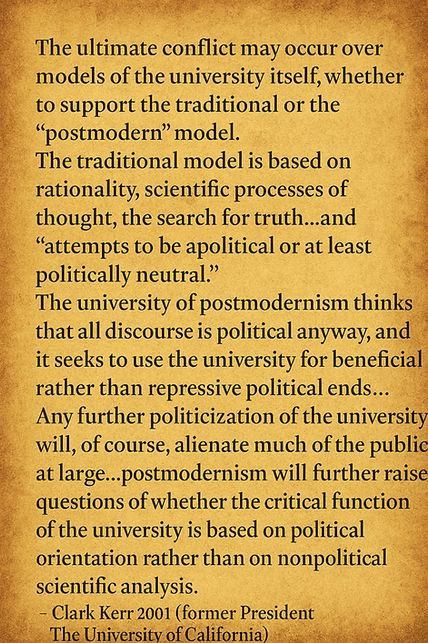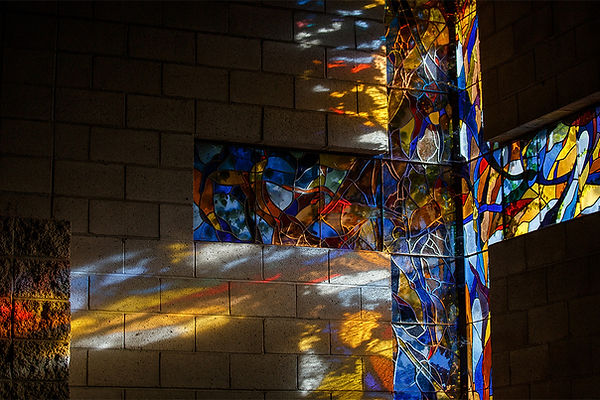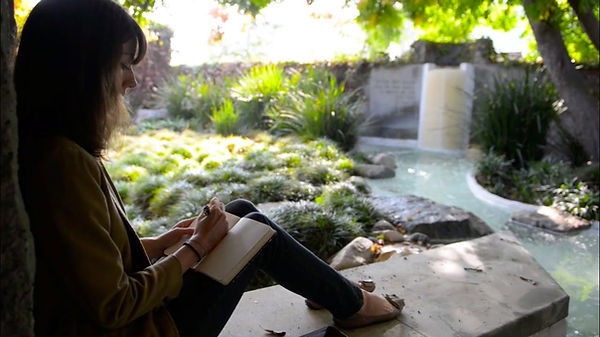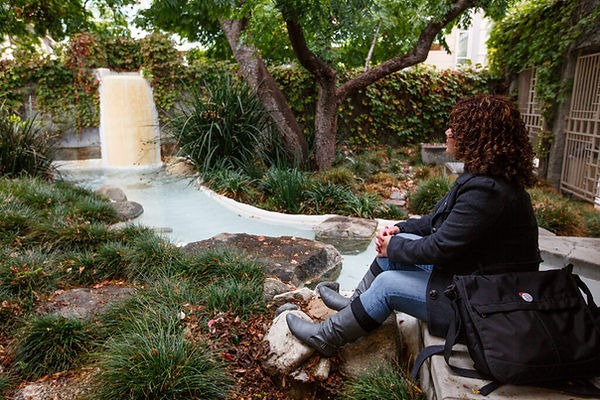
The Gospel isn't partisan
The gospel isn't partisan, and Fuller Seminary shouldn't be either. In the last 10 years Fuller has shown favoritism towards progressive politics.
Help us increase public trust in higher ed, by helping Fuller become institutionally non-partisan.
Our modest proposal to the trustees is this: add a sentence to Fuller's website that says, "Fuller Seminary is a nonpartisan institution."
1/ Progressive land acknowledgements @ Fuller
On Fuller Seminary's official website, under a sub-page labeled "inclusion", there is now a progressive talking point known as a land acknowledgement (wikipedia traces the development in the USA from progressives protesting at Standing Rock in 2016 to the Ivy League Universities making their first land acknowledgements later that same year).
These progressive inspired land acknowledgements have since become sacralized progressive orthodoxy in the United States.
That Fuller Seminary would include a land acknowledgement on it's official website signals favoritism for progressive orthodoxy. Land acknowledgements are interconnected to the land back movement and decolonization. As of Sept 3rd, Ohio State University has banned land acknowledgements in an effort to promote institutional neutrality. This is an example to follow.
“As with a prayer, a land acknowledgment frames an event with the message that a particular ideology has dominance on campus, and will be honored above others.”
-Professor at University of Washington
2 / progressive elements at Fuller Chapel Services
Fuller Chapel services have become flavored with Progressivism. On at least three occasions in the last year, the chapel service was opened with a land acknowledgement (at the 11/12/25 chapel service they made "Confession to the Land"--as if the Land had ears and could hear confessions made to it). It's a very strange way to open a Christian worship service. Lyrics to traditional hymns are now frequently changed to project a more "social justice" progressive vibe. Speakers now rather frequently bring their "outrage" and invective against Evangelicals into their sermons. How must non-progressive students and faculty feel sitting through progressively charged chapel services??
3/ Promoting "Liberation Theology" on Fuller's official Facebook page dated Dec 16th, 2025 Prof Alexia Salvatierra praised Liberation Theology without acknowledging that it is Marxism mixed with Christian theology. Christianity is not in need of any other system to be paired with--especially not an atheist system like Marxism.
In 2021 then President Labberton initiated a DEI office. For our purposes we simply note that DEI is a flagship institution by progressives that progressives wish to "bless" non-progressives with. In a word, any DEI office is by definition partisan (there is, of course, no such thing as a conservative Director of DEI).
Dr. Labberton even wrote in 2021: "Fuller is aware, of course, that “D.E.I.” can be language that is assumed to be secular, and driven by a certain political/ideological lens..." We agree.
Perhaps Fuller might reconsider naming their dei office "welcoming and belonging", rather than signaling to progressives that Fuller favors progressive institutions. It would certainly be more inclusive (in the dictionary sense of the word) to have a welcoming office that doesn't come with a strong whiff of progressive partisanship built in.
If it is denied that Fuller is showing favoritism towards Progressives, then why not institute a rotation of the Director of DEI at Fuller? A progressive director for three years, followed by a political conservative for three years? If that's not acceptable, then how can one argue that Fuller is not showing favoritism towards progressives? ...Even the Progressive Policy Institute writes about "Fifteen Troubling Aspects of DEI".
...............................................................................................................................................
The problems
On Fuller's website, under "our institutional commitments" you will find a strange belief: "We all participate in racism...because we are part of power structures". No, we simply do not all participate in racism. This is a progressive interpretation of racism (with critical theory under-girding the belief).
Are all 'power structures' racist? That seems to be the implication. This highly collectivized, and highly partisan perspective on racism simply is not widely held outside of progressive circles. Does structural complicity really mean universal moral responsibility? If complicity in one structural injustice (racism) is accepted without individual intent, then why not complicity in all structural injustices--like murder and robbery--without individual intent? But, no one participates in murder and robbery simply due to societal structures. Nor do we all participate in racism simply due to societal structures.
Though progressives have an outsized influence on American culture, it's instructive to remember that progressives represent only 6% of all Americans (source: pew research).
The vast majority of Americans do not buy the collective guilt trip that they "participate in racism" simply because they are a "part of power structures."
7/ A progressive re-interpretation of racism
On Fuller's website, under "our institutional commitments" you will also find this explicitly progressive sentence: "We all need a critical theology of racial justice." Critical theology? And everyone needs it? Really? We estimate that 95% of Fuller students have no idea what a "critical theology" is. Certainly none of us who received degrees in theology from Fuller have ever heard of "Critical theology"!
How could it be that "everyone" needs a "critical theology" when that idea certainly was never taught at Fuller prior to 2010ish? Perhaps Fuller should send out an emergency email to all Fuller alumni: "Wait! Before you take another breath you need critical theology! When you were here we only taught you biblical theology, and forgot to teach you critical theology!"
Sooo, what is critical theology? It's just critical theory applied to theology (it is clearly not a Christian theology at all). And if you've been playing along at home these last 10 years, you no doubt have heard how our universities have been overrun by over 100 critical theories (critical geography/critical race theory/critical queer theory/critical whiteness theory/etc).
Originally to be called the "Institute for Marxism", Wikipedia describes the 1923 founding of the Frankfurt school of social research as "the first Marxist research center at a German university." From this school would eventually come "critical theory"--a phrase coined in 1937 but which Horkheimer referred to as "materialism" in his works before 1937.
So, what's the relationship between critical theory and progressive politics in America? We asked Ai...Here's what it said: "In essence, critical theories provide the intellectual foundation and critical insights that progressive politics rely on to advocate for social change."
Therefore, critical theory is the foundation for a decent amount of progressive politics and therefore critical theology is a partisan theology. It now becomes clear why no one before 2010 was taught 'critical theology' at Fuller--it's a partisan theology grounded not in scripture but in Marxist critical theory.
We, therefore, deny that 'everyone' needs a critical theology. And, further, we suggest that theologies grounded in scripture are much better than theologies grounded in the Marxian critical theory tradition--especially given that small detail that Marx was a materialist who was disgusted by and critical of all religion ("the criticism of religion is the prerequisite of all criticism").
We don't deny that critical theories should be studied (as long as other non-critical theologies are studied in the same class) ; but we do deny that Fuller Seminary should institutionally favor progressive partisan theology over biblically grounded theology.
Is it really too much to ask that Fuller rewrite the above sentence to read: "We all need a biblical theology of racial justice" rather than the progressive favoritism of "We all need a critical theology of racial justice"? At the institutional level, we hope for a biblical and evangelical theology--not a critical progressive theology--to ground Fuller's "institutional commitments."
To drive the point home that critical theory, Marxism, and progressive politics are often closely related, we quote from the critical theorist professor who recently wrote a book enthusiastically chronicling the rise of critical theories in our universities:
"The turn to critical Marxist thought is a defining moment in the past 40 years of educational scholarship...it introduced the ideas and vocabulary that continue to frame most conversations in the field...most importantly, ‘critical’ itself, which has become ubiquitous as a descriptor for left educational scholarship.”
-Dr. Isaac Gottesman (from his book "The Critical Turn In Education")
Critical theories can just as easily be labeled "critical Marxist theories" not by a critic, but by an academic who identifies as a progressive. Note that Gottesman believes critical theories are themselves partisan as he highlights how critical theories have "become ubiquitous as a descriptor for left educational scholarship." Left scholarship? In other words, critical theories are partisan progressive "scholarship."
In short, the rise of partisanship at Fuller seems to be directly caused by the rise of critical theories at Fuller. And these developments at Fuller directly mirror the wider rise of critical theories colonizing our universities with partisan activism rather than scholarship (as the Grievance Studies Affair revealed, for instance.)
Corrective action is called for to prevent Fuller from being taken captive by partisan critical theories.
*Note: All eight of these partisan "problems" were non-existent at Fuller Seminary prior to 2010.
8/ Critical Theology???

The 2018 Grievance Studies affair used critical theory jargon to see if just sounding uber progressive could get them published in peer reviewed academic journals. Yes, was the answer. Seven intentionally gobbledygook nonsense papers were published revealing that critical theories have no scholarship clothes. Just naked activism.
5/ Whiteness, not just white supremacy, is now evil
"Perpetuating whiteness" is now labeled a great evil on Fuller's website. This critical theory progressive jargon word is riddled with definitional problems. The dictionary defines whiteness as "the quality of being white in color". There's nothing evil about that. So, Fuller must be using a progressive ideological definition of 'whiteness' rather than the dictionary definition. This, again, shows a preference and a favoritism for progressives at what should be a non-partisan institution.
Americans will remember that the Smithsonian took down it's page on "whiteness" after declaring such things as "being on time", "the protestant work ethic" and an "emphasis on the scientific method" as problems of "whiteness" and "white culture". Thankfully, that ideologically captured mindset was corrected by public outcry, and the Smithsonian retracted their "whiteness" page.
Fuller might remember that the Smithsonian used the terms "white culture" and "whiteness" synonymously in that document--thus when Fuller declares 'whiteness' a great evil, we hope they don't wish to indict an entire culture as evil (the Harvard professor Ignatiev meant 'white people' when he used the term 'whiteness' for example).
6/ A growing unease from Fuller students
A growing number of Fuller students have sounded the alarm that their classes at Fuller were at least partly partisan in nature. One former student said, "There was a left agenda in some of the books and materials assigned. I was surprised." Another student said, "I feel like I would be called a heretic if I were to criticize the progressive party on campus." Another student said, "As a graduate of Fuller, I’m deeply saddened and hopeful that there might be a revival to Fuller’s original vision for missiology and its deep theological foundations towards the missio Dei, outside of current political narratives in the culture."
Univ of Michigan professor explicitly points out the partisan goals of teaching students critical theory

At the 11/12/25 chapel service they had a progressive land acknowledgement, AND a "Confession to the Land" ritual.
We emailed perhaps the most preeminent public intellectual in the United States, Dr. Jonathan Haidt, to get his thoughts on critical theory's ideological capture of our universities.
Dr. Haidt is a professor of Social Psychology at NYU, and the author of "The Righteous Mind: Why Good People Are Divided by Politics and Religion".
He is also co-founder of the Heterodox Academy which was formed exactly 10 years ago, because of the rise of critical theories taking over our universities (what the heterodox webpage labels "the rise of closed-minded orthodoxies within scholarly communities"). Heterodox Academy now has over 7,000 academic members who wish to end progressive echo chambers in higher education by championing viewpoint and political diversity among faculty members and in the curriculum.
It is worth noting that both the President of Fuller Seminary (Dr. Goatley), and the chair of the Trustees at Fuller (Dr. Shirley Mullen) are both members of Jonathan Haidt's Heterodox Academy.
Dr. Haidt wrote us back and explained: "critical theories are activism not scholarship". If he's right, the question becomes for Fuller and our universities: do they want to pursue partisanship or scholarship?
We urge Fuller's Trustees to watch Dr. Haidt's lecture from 2016 about the coming split in higher education between "social justice universities" and "truth seeking universities." His words echo the concerns of the President of the University of California System, Clark Kerr, from 2001. Kerr predicted, similar to Haidt, that a split between "traditional universities" and "postmodern universities" was coming. We hope Fuller will choose to be a truth seeking seminary, rather than a postmodern seminary that "uses" the seminary--like a parasite uses it's host--for "political ends" -Dr. Clark Kerr
Haidt has warned, in apocalyptic terms, that Americans trust in Higher Education has reached an all-time low. An overall trust of 57% in 2015 is down to 36% in 2023. "Republicans had the largest drop in confidence from 2015-2023, declining from 56% to 19%." (-Gallup) A full 68% of "US Americans" believe higher education is 'headed in the wrong direction' (Gallup, 2024).
If progressive theories in the classroom and progressive politics in our universities administrations have gone up astronomically these last 10 years, then just put 2 and 2 together and it's clear why higher ed is facing a massive crisis of public trust.
"Any further politicization of the university will, of course, alienate much of the public at large." -Clark Kerr (former President of U.C. Berkeley) Which way Fuller? Which Way? More politicization of the seminary--or less?
As Dr. Haidt warns: "Activism is incompatible with scholarship."



Who we are
We are a growing number of concerned Fuller Alumni who have watched Fuller rapidly become a progressive partisan seminary in the last 10 years.
The gospel is not partisan. Evangelicalism should not be partisan--either from the left or the right. We are concerned that the global gospel is being shrunk down by being couched in progressive rhetoric.
OUR HOPE AND GOAL
Our goal is to mitigate Fuller's leftward drift--and increase the public's trust in Fuller--with a modest proposal for the Trustees:
1. Please add one sentence to Fuller's website. A simple declaration that "Fuller Seminary is a nonpartisan institution".
Especially if the board of trustees at Fuller doesn't perceive the institution to be favoring progressive politics, then it should be fairly easy to pass a resolution to put in writing that Fuller is, indeed, an institutionally non-partisan seminary.
Additionally, at least 148 universities in the last two years have declared themselves institutionally neutral/non-partisan. So, Fuller would hardly be alone if the trustees were to pass such a resolution.
For example, Claremont Mckenna College now has a 'statement of institutional non-partisanship' which reads in part: "Making partisan choices or statements is a fundamental individual right...But when colleges and universities take sides, they corrupt the necessary conditions for learning and the role of higher education..."
F.I.R.E. just rated Claremont Mckenna College the #1 college in America for best free speech on campus.
Institutional non-partisanship is understanding that the Trustees/President/Website act like an umpire of a baseball game--they call balls and strikes. But, they do not root for one side to win. That would destroy the integrity of the game.
Should our mission be accomplished, all students and staff will hopefully feel equally welcomed and free to share both progressive and non-progressive thoughts on campus.
"My brothers and sisters, believers in our glorious Lord Jesus Christ must not show favoritism." -James 2.1







have you gotten any response from the administration?
not sure this is a helpful site
Do you really think that adding a sentence to the seminary’s site will help? how?
Hey, this is a great information!
thanks for this website. totally needed.
Do you think land acknowledgements are partisan though? Aren't they just recognizing the history of our country?
Welcome to our new comments section! Please feel free to share your thoughts and feedback with us!